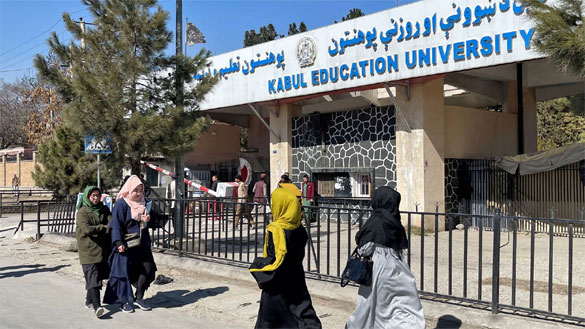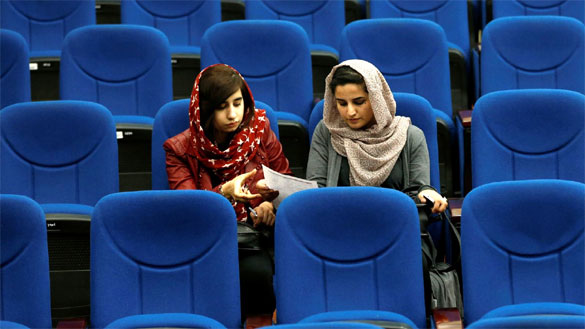Taliban Bans Women from Universities: Why it’s not Surprising

By
Arshad Alam, New Age Islam
21 December
2022
Muslims Need
To Question the Theology from Which Such Ideas Spring Up
Main
Points:
1. Yesterday,
the Taliban barred women in Afghanistan from accessing higher education
2. It is now
increasingly clear that the notion of a good Taliban was a chimera
3. Such
regressive ideas about springs from Islamic jurisprudence
4. Deoband in
India, from where the Taliban derives its inspiration, also holds similar views
regarding women
5. Without
questioning the dominant Islamic theology, a resistance against such
antediluvian ideas cannot be mounted
-----

Female
students in front of the Kabul Education University
----
When time
to withdraw the American-led forces came close in Afghanistan, we started
hearing about ‘good Taliban’, though that was not for the first time. We were
told that Taliban 2.0 was different from its earlier version, that the ‘new
version’ was reformed and hence sensitive towards the question of women’s
dignity and empowerment. The gender question became important in Afghanistan
because under the earlier Taliban regime, women were restricted to their homes,
and their education and employment was deemed as satanic. In the interregnum,
when the US-led forces overthrew the Talibs, women gained some ground they had
lost during the Islamist rule. They were allowed to go back to schools and
universities and many gained employment and public visibility. The new version
of the Taliban, which came to power in 2021, promised to keep these gains and
not go back to their antediluvian ways. The western world agreed. Not because
they necessarily believed in the Taliban but because the pressure to withdraw
was so much that they readily accepted whatever the new regime was offering.
For some
months, the Taliban kept their promise but eventually the Islamists within them
started putting curbs on women. After all, the women’s question is fundamental
to any Islamists politics. A sophisticated body of Islamic jurisprudence deals
with women’s place in society and it was only a matter of time when the Taliban
would renege on its promise. We now understand that their promise of protecting
women’s freedom was just a sham. The mediatized creation of the ‘good Taliban’
was a myth that no one believed in. In the end, it is the women of Afghanistan
who are bearing the brunt of this so-called Islamic revolution.
The method
was for all to see. The Taliban has been putting curbs on women’s freedom ever
since they came to power. In March this year, they barred girls above sixth
grade to access schools. The schools did eventually open but only after the
Taliban had made ‘suitable changes’ like segregated classrooms. Then in May
2022, they ordered girls and women to cover up in a Chadori (head to toe
Burqa) which they thought was ‘traditional and respectful’. Women could
not show their faces in public and in case of any infringement, the regime
decided to punish the closest male relative of the women. They were to be fined
or even fired from government service if ‘their women’ went without the Chadori.
It should have become clear by now that for the Taliban, women were the
property of men (fathers and husbands) and that’s why they sought to punish men
for not keeping their women in control. Women protested, which is a rarity in
that country, but the protest was brutally broken up by the regime in August
this year. They were demanding the right to education and employment, which
should automatically come to them as citizens. But not in Afghanistan, because
the regime never thought of them as citizens but merely appendages to men. In
the meantime, the Taliban continued restricting women from public spaces.

Female
students at the American University of Afghanistan
-----
The latest
in the series of restrictions announced yesterday is that women will not be
allowed to access universities, which closes the avenues of higher education
and any future employment for them. This is not a temporary measure as the
regime has not given any time frame after which women will be allowed back into
higher education. They have not cited any reason except that it is being done
in ‘national interest’ and for ‘women’s honour’. Probably for the first time,
we have an articulation of national interest without the interest of women
involved and women being honoured by being debarred from universities.
It's clear
that only fools really believed in the promise of a ‘good Taliban’. Only the
gullible thought that the regime had the capacity to reform itself. The Taliban
wants us to believe that there are other pressing issues plaguing the country
such as food shortages and a collapsing economy that demand more attention.
These issues do exist, but many a times citing their primacy acts as a
deflection from the women’s question, which should not be any less important
than reviving the economy.
The reaction
to this regressive move will be condemnation from international quarters,
particularly the western world. But then the Taliban know that such
sanctimonious condemnations will not have any bearing on them. Till the time
there is any real pressure brought on the regime, nothing much is going to
change in terms of how they treat their women.
But why is
the Taliban depriving its women of fundamental rights to education? Where does
this belief that women’s rightful place is within the home come from? To understand
this, we have to get into Islamic theology and jurisprudence, which treats
women as nothing more than an appendage of men. The Taliban springs from the
ideology of Deoband. In 2010, the famous madrasa at Deoband issued a fatwa
debarring Muslim women from working in government or private sectors. The fatwa
read: “It is unlawful for Muslim women to do job in the government or private
institutions where men and women work together and women have to talk with men
frankly and without the veil.” Now one can certainly put a spin by saying that
the fatwa does not debar women from working but only wants them to be properly
veiled (including the face) and not talk to men “frankly”. The problem is that
this fatwa puts a majority of work situations outside the pale of women since
most spaces today are mixed. If one follows the spirit of this fatwa, then the
only working spaces left for them would be teaching all-women classes or giving
gender segregated training in fields like pickle making, etc. And that’s precisely
the problem: Deoband and its attendant theology treats women as lesser human
beings who are neither fit nor competent to work alongside men.
To make
things clearer, here is another gem of a fatwa from Deoband issued in 2008: “It
is not a good thing for women to do jobs in offices. They will have to face
strange men (non-Mahram), though in veil. She will have to talk and deal with
each other which are the things of Fitna (evil). A father is committed
to provide maintenance to his daughter and a husband is asked to provide
maintenance to his wife. So, there is no need for women to do jobs which always
pose harms (sic) and mischief.” The fatwa underlines the thought process, and
makes it clear that women do not have any independent volition under the Islamic
law. According to this idea, since men are the providers, women should always
be under the custody of men.
To some
extent, it seems the Islamic law also treats women primarily as sex objects,
whose presence can corrupt or entice men. Why else would women become a source
of Fitna simply because she is interacting with men? The Taliban are
only being true to what they were taught in their Deobandi madrasas. They are
only implementing what they think is the divine ruling on how women should be
treated.
If we are
really concerned about the plight of women in Afghanistan, let’s question the
theology from which it derives its legitimacy. Any other attempt to understand
the plight of Afghan women will be an exercise in pure deception.
-----
A regular contributor to NewAgeIslam.com, Arshad
Alam is a New Delhi based independent researcher and writer on Islam and
Muslims in South Asia.
URL: https://newageislam.com/islam-women-feminism/afghanistan-taliban-bans-women-universities/d/128673
New Age Islam, Islam Online, Islamic Website, African Muslim News, Arab World News, South Asia News, Indian Muslim News, World Muslim News, Women in Islam, Islamic Feminism, Arab Women, Women In Arab, Islamophobia in America, Muslim Women in West, Islam Women and Feminism
